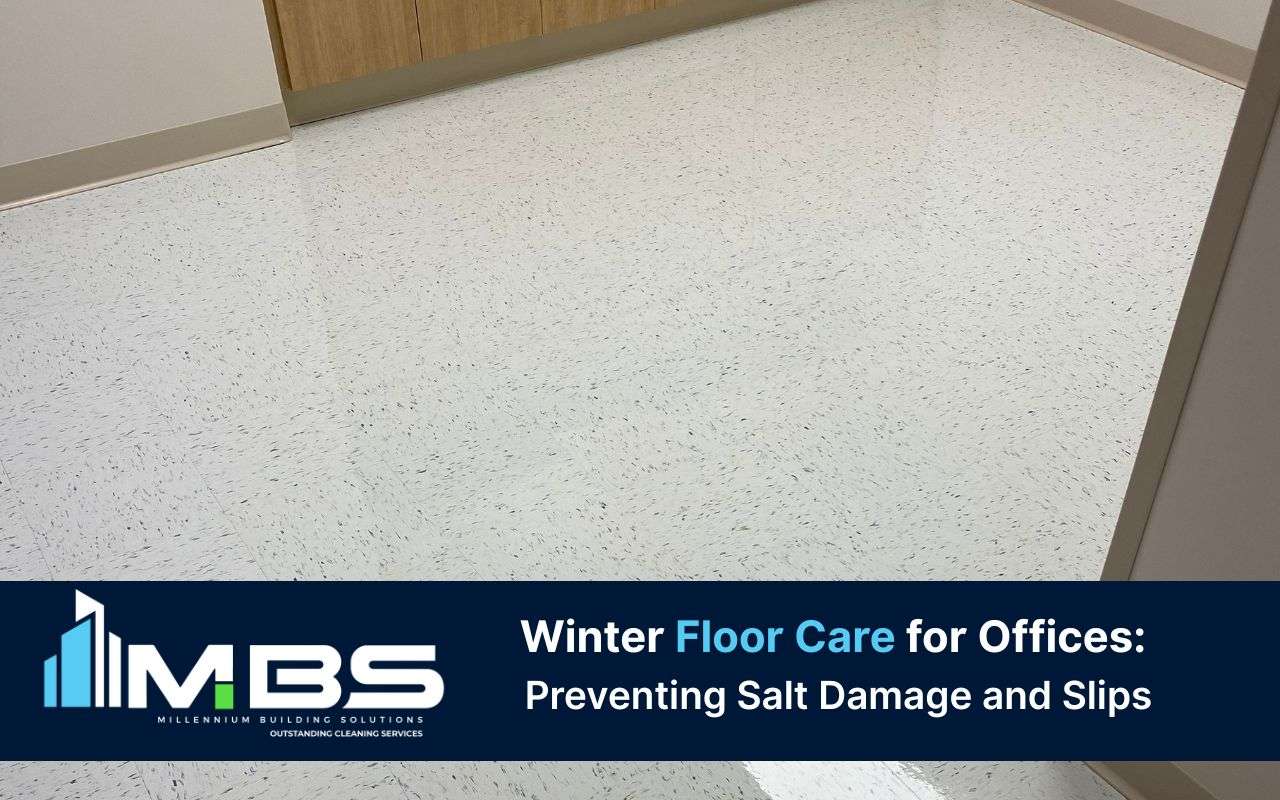
Winter brings both charm and challenges. The cold months often leave office floors exposed to slush, dirt, and salt, making winter floor care for offices essential. Those tiny salt crystals that prevent outdoor slips can severely damage interior surfaces. Over time, they cause scratches, stains, and dull finishes. Therefore, adopting a proactive maintenance approach becomes crucial during this season. A well-planned strategy may include an effective entry mat program and a dedicated VCT winter maintenance plan. These combined efforts help preserve your floor’s appearance and ensure everyone’s safety. For more information on our professional services, visit our services page.
Importance of Winter Floor Care for Offices
Proper winter floor care for offices goes beyond appearance—it’s a matter of protecting your investment. Daily foot traffic introduces moisture and grit that wear floors quickly. Without regular maintenance, scratches and discoloration soon become permanent damage. This leads to costly repairs or even replacement. By prioritizing a detailed cleaning plan, businesses can extend the lifespan of their floors and reduce disruptions caused by renovations.
- Preserve flooring materials and finishes.
- Prevent long-term damage and avoid costly repairs.
- Maintain a professional and welcoming workspace.
Moreover, clean floors reflect company professionalism. Clients and employees notice these details immediately. A polished, well-maintained space enhances brand image and supports a positive work environment. Ultimately, a consistent maintenance schedule fosters safety, efficiency, and pride in the workplace.
Understanding the Effects of Salt Damage on Floors
Salt may prevent icy accidents outside, but indoors it becomes a serious problem. As people walk in, salt particles grind into the surface. Gradually, this abrasion dulls the floor’s finish. Salt also attracts moisture, keeping floors damp longer. Excess moisture can weaken tile adhesives and promote mold growth on porous materials. For vinyl, stone, or concrete, the result may be haze, scaling, or surface peeling.
- Salt crystals act as abrasives, causing micro-scratches.
- Moisture trapped by salt leads to structural weakening.
- Surfaces lose shine and durability without proper care.
Understanding these effects emphasizes the importance of proactive measures. Controlling salt at the entrance helps limit the spread indoors and supports effective winter floor care for offices.
Choosing the Right Entry Mat Program
An entry mat program is the first defense line against dirt and salt. Quality mats trap grit and absorb moisture, keeping it from spreading. Look for multi-zone mat designs with scraping and absorbent areas. This combination effectively removes debris and keeps interiors dry.
- Install mats inside and outside all main entrances.
- Clean or replace mats frequently to maintain performance.
- Use absorbent zones near high-traffic corridors and elevators.
Integrating mats into your winter maintenance plan reduces cleaning time and minimizes wear. You can learn more about implementing these programs by contacting our experts through our contact page.
Best Practices for Entryway Maintenance
Consistent entryway care reduces the spread of salt indoors. Regular inspections help identify soaked mats or slippery spots needing immediate attention. Additionally, keeping outdoor walkways clear of snow decreases the dirt entering your building. Coordinated efforts—snow removal, mat cleaning, and designated pathways—simplify overall maintenance. As a result, your winter floor care for offices becomes more effective and less time-consuming.
Implementing a VCT Winter Maintenance Plan
Vinyl composition tile (VCT) remains a favorite in many offices due to its resilience. However, maintaining its glossy finish during winter requires a precise plan. Routine sweeping and damp mopping prevent scratches and salt residue buildup. A periodic burnishing schedule restores shine and seals pores, shielding against further salt damage.
To maintain ideal results, your VCT winter maintenance plan should include:
- Daily dry and damp mopping to remove debris.
- Weekly polishing for consistent brightness.
- Monthly inspection and refinishing as needed.
By following these steps, businesses can ensure durability and longevity even through harsh winters.
Recommended Cleaning Products for Winter Floor Care
Using the right cleaning agents matters. Choose neutral-pH cleaners suitable for your floor type. Harsh detergents may eliminate salt but could damage finishes. Balanced cleaners remove residues gently without harming the surface. Pair these with microfiber mops or high-absorbency pads for best results. This combination enhances efficiency and keeps floors spotless throughout the season.
Additionally, applying protective coatings with moisture resistance creates a defensive barrier. These coatings repel water and prevent salt stains. When integrated into your winter floor care for offices plan, they maintain cleanliness and shine effortlessly.
Strategies for Preventing Slips in Office Spaces
Safety must always come first. Moisture and salt can make hallways slippery. To avoid accidents, consider placing absorbent runners and using visible caution signs. Quick-response cleaning systems are also helpful when unexpected spills occur. Sticky mats at transition points add another layer of safety.
Moreover, train staff to report and manage wet zones immediately. With vigilance, timely cleaning, and smart preventive measures, you can maintain a safe work environment for everyone.
Ensuring Safety and Comfort for Office Visitors
First impressions count. A clean, dry lobby signals professionalism and care for visitor comfort. Anti-fatigue mats near reception areas make standing easier, while balanced indoor temperatures help moisture evaporate faster. Dehumidifiers or improved ventilation near doors reduce condensation. These small steps work together to enhance your winter floor care for offices strategy.
Professional Floor Care Services for Winter Maintenance
While daily cleaning helps, professional services deliver deeper, more consistent results. Certified floor technicians use advanced tools like automated scrubbers and high-speed burnishers. Their expertise guarantees precise attention to detail. They can tailor maintenance schedules to your office’s specific needs, adjusting frequency as weather conditions change. Partnering with professionals ensures reliable performance, compliance with safety standards, and lasting floor protection. To discover more about expert maintenance programs, explore our services page.
Frequently Asked Questions
How often should I clean entry mats during winter?
It’s best to clean or replace mats daily in high-traffic areas. Regular maintenance prevents salt buildup and improves traction.
What is the most effective cleaner for salt residue?
Neutral-pH floor cleaners specifically formulated for winter use are ideal. They dissolve salt without damaging finishes.
Can salt permanently damage vinyl floors?
Yes, if neglected. Salt can etch and dull vinyl surfaces. Consistent winter floor care for offices prevents this damage.
Do I need professional help for VCT maintenance?
Professional cleaning ensures deep restoration and long-term durability. Experts have specialized tools and products for optimal results.
How can I reduce slip risks during snowy days?
Combine proper mat placement, quick cleanup routines, and anti-slip coatings. These steps significantly lower slip hazards.
Maintaining Pristine Floors Throughout the Winter
Effective winter floor care for offices combines prevention, maintenance, and professional support. With clean mats, proper cleaning products, and trained personnel, your floors will withstand harsh weather effortlessly. By taking these steps, businesses protect their investment and ensure a safe, appealing workspace. Don’t wait for salt stains to appear—act now and contact our team through the contact page to plan your winter maintenance strategy today.
